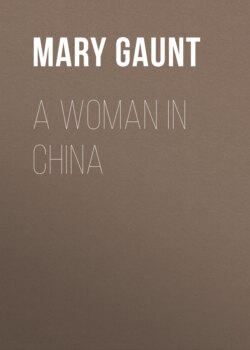Читать книгу A Woman In China - Mary Gaunt - Страница 5
На сайте Литреса книга снята с продажи.
Оглавление
“Four roubles, twenty kopecks.” Why I had to pay I know not, that was beyond me, but I was glad to get off so lightly, for had they seen fit to ask me one hundred roubles, I should have been equally helpless. I was thankful to get out of the cold back to my warm and evil-smelling coupé.
And at Ch'ang Ch'un I fairly felt I had crossed half the world, and the oldest old world greeted me with active winter. I did not know then, as I do now, how wonderful a thing is a snowstorm in Northern China. Here the snow was falling, falling. We had left behind us the great spaces of the earth, and come back to agriculture. Through the whirling snowflakes, little low-roofed houses, surrounded with walls of stone with little portholes for guns—the Japanese block-houses, for Japan holds Manchuria by force of arms—alternated with farmhouses, with fences of high yellow millet stalks. The doors were marked with brilliant red paper with inscriptions in Chinese characters upon it—a spot of brightness amidst the prevailing white that lent tone and colour to the picture.
Here it was that the Russians and the sons of Nippon had been at death-grips, and we who were in this train realised why the Eastern nation had won. At Kharbin and at Manchuria, with things managed by Chinese, reigned confusion. That we ever emerged with a scrap of luggage seemed to be more by good luck than good management. From Ch'ang Ch'un to Mukden the little men from the islands in the eastern sea run the railway, and they know what they are about; everything is in order, and everything marches without apparent effort. They bought this land with their blood, and they are holding it now with the sure grip that efficiency gives.
At Mukden a blizzard was raging, and the old Tartar City was veiled in snow. When the snow went, the sunshine was bleak and bright, and everywhere, far as the eye could see, stretched tilled fields, bare of every green thing. Flatter and flatter grew the land. It was half ice and half earth, and the little sledges that were hitherto drawn by ponies were now drawn by men. Once we had left behind the Siberian fir, there was not a green thing to be seen all the way to Peking. The earth of the fields was streaked, dark brown and lighter brown; there were bare trees with their promise for the future; and once we were in China proper, there were the graves—graves solitary, and graves in clusters—just neatly kept little heaps of earth piled up and pointed, something like an ant-hill. The air was clear and sparkling, the outlook was wide. We passed town after town, and where on the Siberian border the names of the stations were in Russian and Chinese, and so equally unintelligible, here in China they were in English and Chinese.
“Do you like China?” I asked a Frenchman who sat opposite me at tiffin.
“No,” said he frankly. “It is too English.” But he laughed when I said that naturally I considered that a distinct point in the Chinaman's favour.
A wind rose, and it was as if the brown earth were literally lifted into the air. Everything was smothered in a dust storm. The atmosphere was heavy as a London fog, a fog that had been dried by some freezing process. The air was full of dry brown particles that shrivelled the skin, and parched the lips, and made me weigh in my mind the respective merits of a soft, moist air, and a clear and sparkling one. I had left London in a yellow fog that veiled the tops of the houses, and lent an air of mystery to the street in the near distance, I arrived at Peking in a typical North China dust storm. We came through the wall, the wall of the Chinese city, that until I had seen the Tartar wall looked grey, and grim, and stern, and solid, and I wondered at the curved tiled roofs, and the low houses, and the great bare spaces that go to make up the city.
The East at last, the Far East! All across the old world I had come; and here on a bitter cold February afternoon, with a wild wind blowing, the train drew up outside the Tartar wall, the wall that Kublai Khan and the Ming Emperors built in the capital city of the civilisation that was old when the Roman legions planted their eagles in the marshes of the Thames. I had reached China, the land of blue skies and of sunshine; the land of desperate poverty and of wonderful wealth; the land of triumph, and of martyrdom, and of mystery. What was it going to hold for me?
